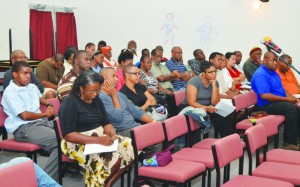
A public consultation on the recently-drafted Beach Control (Amendment) Bill, and the Beach Vending Regulations, attracted many persons, at the Teachers’ Resource Centre on Tuesday evening, to air their views on what has become a hot issue.
The draft legislation and public consultation have come against a backdrop of complaints against vendors received, over a period of four years, from tourists and owners of restaurants and hotels.
Some of the complaints are that vendors, peddling their goods and services, are unnecessarily harassing tourists relaxing on the beach. Another side of the complaints, is that vendors of chairs, and other equipment, feel that they are being disadvantaged and denied an opportunity to eke out a living in competition with restaurants and hotels which supply their own seating accommodation, and other facilities and services, in exclusive areas adjacent to the properties. In short, the situation has been described as a three-sided conflict which must be addressed so that there could be a win-win situation for all parties.
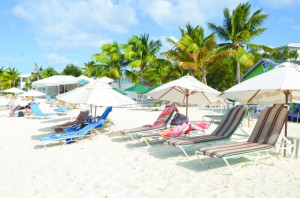
Shoal Bay Beach, dubbed one of the world’s best beaches, which is heavily patronised by visitors, and has a cluster of tourism properties, is the main area of the complaints.
The objects and reasons of the previously-mentioned Beach Control (Amendment) Bill have been set out as follows: “Beach vending in Anguilla has increased over the years, resulting in tension between beachfront proprietors, tourists and beach vendors. The Ministry of Tourism and the Anguilla Tourist Board have received numerous complaints about the aggressive behaviour of vendors and conflicts between vendors and beachfront proprietors. In response to these complaints, a beach vending policy paper was drafted and approved by Executive Council. That policy calls for the regulation of beach vending businesses, including a prohibition against beach vending except in accordance with a permit.

“To give effect to this policy, certain amendments to the Beach Control Act are required and are proposed in this Bill. Specifically, this Bill makes provision for the following – adding definitions related to the regulation of beach vending; updating the appeals provision to provide for appeals relating to beach vending permits; and enabling the creation of offences and penalties by regulation.”
The Beach Vending Regulations provides for the following permit fees: Rental of beach equipment: $200; Sale of souvenirs, arts and craft and apparel: $200; and provision of fine art services (like hair-braiding and massaging):$500.
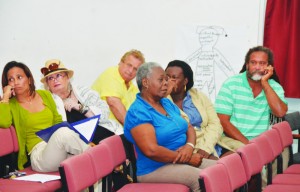
The regulations further impose certain penalties for offences. These are imprisonment for a term of 12 months or a fine not exceeding $50,000 or both; and an additional fine of $2,000 for each day during which the contravention continues; a fine not exceeding $1,000 for not visibly wearing an identification card during hours of operation; and in the case of a continuing contravention, an additional $250 for each day during which the contravention continues.
The public consultation, referred to above, was chaired by Permanent Secretary in the Ministry of Home Affairs, Arjul Wilson, and explanations regarding the Bill and the Regulations were delivered by Director of Lands and Surveys and Curator of Beaches, Gifford Connor, and Deputy Director, Leslie Hodge.
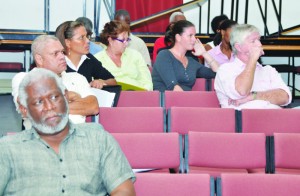
The background to the legislation and related matters was explained by Director of Tourism, Candis Niles. She said that Shoal Bay was Anguilla’s “most important icon,” in the marketing of its beaches, and that it had been voted as “the best beach on the planet”. She lamented, however, that both the Tourist Board and the Anguilla Hotel and Tourism Association had received many complaints from visitors about the service there, with particular reference to vending.
She said there was a need to address the situation which “was spiralling out of control”. According to her, there were claims of vendors moving up and down the beach stalking tourists and disturbing them while relaxing. Another complaint was the proliferation of beach chairs and the need for order and decency. Mrs Niles recalled that 2012 saw a large increase in the number of visitors and property owners making complaints mainly about Shoal Bay and to a lesser extent at Meads Bay, Rendezvous Bay and Cove Bay.
Parliamentary Secretary, Tourism, Haydn Hughes, referred to complaints on Trip Advisor.com on beach vending at Shoal Bay and stressed the need for regulations which he said were not aimed at removing the opportunities of vendors. He said that a designated or fixed area for vendors to operate was arranged at the left side of the entrance to Shoal Bay Beach, extending to a distance of twenty feet.
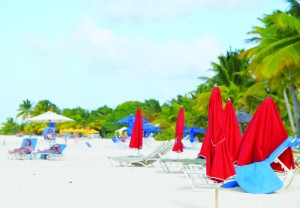
President of the Anguilla Hotel and Tourism Association, Delroy Lake, painted a graphic picture of vendors “harassing” visitors on the beach, placing their vending bags on the chairs or hitting against the chairs in order to get the attention of the occupants. He also told of occasions when vendors entered Ku Hotel at Shoal Bay, where he once served as Manager, or ran after tax-drivers driving to or leaving the property, to peddle their goods and services to visitors.
Gilda Gumbs-Samuel, the Association’s Executive Director, said that as a result of the vending situation and the experience of visitors there, Shoal Bay had not been mentioned as one of the best beaches in the world four years, and had been relegated from number one to number 30. She told her listeners that she had contacted the other Hotel and Tourism Associations in the Caribbean region and had discovered that the islands were removing vendors from the beaches and accommodating them elsewhere in designated locations.
She was grateful to the Parliamentary Secretary for working with the Tourist Board and the Hotel and Tourism Association to get the beach vending and control regulations to the present position.
Sutcliffe Hodge, one of the more vocal persons in the audience, said there was a need to give consideration to the unemployment situation on the island and the little opportunities for persons to make a living. While he understood the need for exclusivity of adjoining space for guests at restaurants and hotels, he expressed the view that beach vending should be reserved for local vendors. “For them to be restricted to occupy any part of a public beach is disturbing,” he stated.
Marcel Fahie, a retired Permanent Secretary, said there was a need to resolve the conflicts among the various stakeholders – the restaurant, hotels and the vendors – in a compromised manner in order to avoid ending up with winners and losers. He stressed that the aim should be “to move from a conflict model to a harmony model.”
Mr.Fahie wondered whether the draft legislation, regulations and permits were not “legalising the conflict” and indicated that there was a need for refinement of some of the provisions. Citing the 200-dollar fee for a beach vending permit, the fine of $50,000 and a year imprisonment, he was of the view that there was a need for balance in the fees.
A number of beach vendors were at the public consultation, one of whom described the proposed arrangements as “draconian regulations”.
Merilla Martin, a well-known vendor, occupying a seated location near the entrance to Shoal Bay Beach, said she was contented with her area of operation, making and selling beads and craft work. Mrs. Martin, 88, said she enjoyed her relationship with visitors and was even advising them “how to fall in love”.
The three-hour pubic consultation was brought to an end by Permanent Secretary, Ms Wilson. She told the members of the audience, who offered suggestions, that their views would be taken into account in the amendments to the Beach Vending Regulations.








